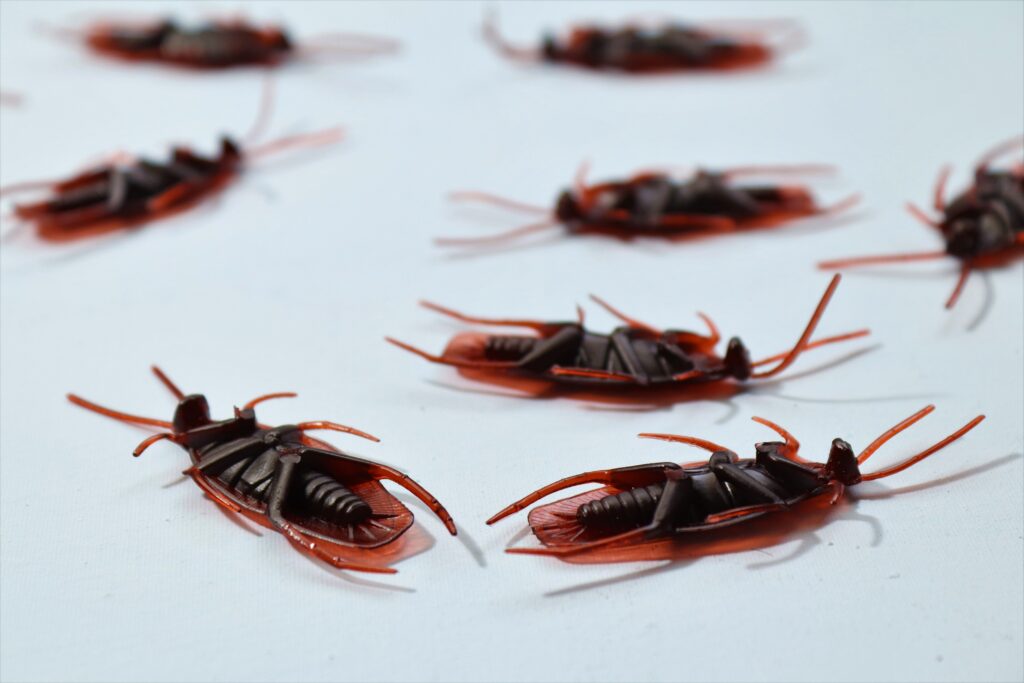Pests can pose a serious threat to your family’s well-being, your garden, and your household, as a whole. Rodents and cockroaches have the potential to spread life-threatening diseases, while termites can cause significant damage to your home.
Luckily, the only tools you’ll need to get rid of household pests is some creativity, few household products, and some basic knowledge of pest-control methods.
While there may be some infestations that demand the expertise of an exterminator in Kansas City, DIY pest control solutions can be useful in-between pest control appointments and routine maintenance. But if you want professional full-spectrum exterior pest prevention service, contact Greener Grass’ pest control services.
Essential steps for effective DIY pest control
DIY pest control can be effective when done properly. Here are some important steps you should take to ensure successful execution.
Identify the pest properly before treatment
Correctly identifying the pests that are terrorizing your home will help you select the best DIY pest treatment method. It will also allow you to customize your pest control method of-choice to guarantee the best results. Being aware of the type of pests you’re dealing with may even prevent the recurrence of pest infestations.
To identify these tiny intruders, scour your property thoroughly and search for evidence such as droppings and chew holes. Since most pests prefer staying out-of-sight, these clues will allow you to identify the type of pests that may be lurking in your garden or in the dark corners of your basement.
Locate common entry points
Next, identify the accessible entry points pests can use to enter your home. Areas around the doors, windows, roofline, and foundation are the most common entry points for unwanted pests.
Sealing or blocking these entryways using DIY methods can prevent future invasions. Without intervention, ants and roaches can squeeze through the small openings, while rodents chew their way into your home.
Determine the right treatment
Most DIY pest control methods do not require special equipment or expertise. They only demand your dedication and a few hours of your time.
For roaches, a baiter will get the job done. Remember, if you eliminate any food scraps or stray crumbs that may attract them to your home, you’ll have the greatest success. If your home is infested with mice, you will want to experiment with traps and baits. The same method applies to termites, place traps along the perimeter of your home, and let them work their magic.
What are the benefits of using DIY pest control methods?
It’s cost-effective
Do-it-yourself pest control is far much cheaper than hiring an exterminator. You can dodge overwhelming labor costs, and you’ll only need to buy a limited supply of pest control products.
You are in control
DIY pest control allows the freedom to handpick the products best-suited to your pest control needs. Some commonly-used chemicals are hazardous. With this in mind, account for all the areas in need of treatment, and restrict access to common living spaces coated with potentially-toxic DIY solutions,.for the safety of your kids and pets. Avoiding accidents should always be your first priority.
Convenience
When you oversee your own pest control, you can fight household pests on your own time table. Scheduling an appointment with an exterminator can be difficult, especially when you have to maneuver your own busy schedule and the availability of your local exterminator.
For those of you who value privacy, controlling pests on your own accord is a cheap and easy way to keep your home a private sanctuary. Unfortunately, some pest exterminations mandate complete evacuation from the home, leaving your home under the supervision and control of a stranger.
You know exactly where the pesticides have been sprayed
Safety is a major worry in houses with pets or young children, and people frequently feel safer if they are aware of the chemicals that have been used in their homes. You cannot accompany specialists into each and every room while they work. As a result, if toxic chemicals are used on the floor and your kid is crawling on the same surface, the chemicals may endanger your family more than they may benefit them. People thus choose to complete the task themselves to make eventual family protection simpler.
DIY pest control tips
Store food properly
Keeping food near your home’s entry points can attract unwanted insects and other household pests. To avoid costly infestations, you should store food in secure and tightly-sealed containers. With outdoor food supplies, consider fencing your vegetable gardens and surrounding areas with a net.
Seal them out
Pests cannot enter your home unless they are able to do so. Some pests can enter your home through even the smallest cracks. Look for any potential entrance points on the outside of your house, and then seal them with caulk, steel wool, etc. Be sure to inspect the roof, utility pipes, cables, and wires, as well as the foundations, door frames, and windowpanes. Fix any windows and screens that are damaged. Pipes and vents should have any openings, cracks, or gaps filled in.
Keep it clean
A clean home is far less attractive and welcoming to bugs, which is a very simple explanatory statement. Every day, wash your dishes, and clear any food debris from the sink. After each usage, discard any filthy dishwater. Keep your kitchen’s counters and surfaces clean every day. Use airtight glass or plastic containers to store food and beverages. Consider including sweeping, mopping, and vacuuming in your normal regimen. Utilize trash containers with locking lids and empty them frequently. Keep the lawn groomed and remove weeds. Keep trees and shrubs pruned so they don’t touch the home. You should keep up your drainage systems and get rid of any standing water.
Keep it dry
It will help to keep pests at bay to keep your home dry and well-ventilated. Because most pests are drawn to moisture, crawlspaces, attics, and basements make excellent breeding grounds for them. Use a dehumidifier to reduce moisture, and think about enclosing your crawlspace to help you get rid of bugs and save a lot of energy.
Identify common pests in your area
Research the most prevalent pests in your area and find out what kind of harm or threat they pose. Knowledge is powerful. Depending on the area, different pests require different treatments. Proper treatment depends on accurate identification.
Use the pros
Sometimes an infestation is excessive for do-it-yourself pest control techniques to handle. In such cases, it is essential to contact a specialist who can correctly identify the pest you are dealing with, provide the necessary treatment, and give ongoing prevention methods you can apply at home.
Contact your neighborhood pest control firm for a comprehensive assessment if you think you might have a pest problem.
Reasons Why You Should Not Do DIY Pest Control
Americans enjoy performing repairs and home improvements themselves. People are constantly looking for methods to save money and take on their own initiatives.
However, DIY pest control techniques might really do more harm than good to you and your house when it comes to removing bugs from it.
It is only natural to desire to get rid of bugs as soon as possible when they attack your home. Until it isn’t, a DIY solution may seem like an efficient and affordable way to solve the issue.
A lot of chemicals and pesticides are used in the control of pests, and if not used properly, they can be quite deadly. Read on to learn why you should never attempt DIY pest control if you have a pest problem in your house and aren’t sure whether to hire a professional exterminator or do it yourself.
1. You’ll underestimate the problem
The likelihood is that if you find a bug in your home, they have already constructed a nest either inside or outdoors. The tiny insect or rodent you just saw might not even be close to the real thing.
Termites, for example, are very effective at concealing and may not be discovered until they have seriously harmed your property. DIY pest control primarily concentrates on what is visible rather than what is hidden.
Experts in pest management take their time to research and understand how each type of pest behaves. They are aware of what to search for and where to seek when employing specialized tools to help identify the problem’s root cause. They can provide a remedy that will guarantee the absence of pests in your house.
2. Environmental risk
When using a DIY solution outside your house, you run the risk of harming non-harmful insects like bees and butterflies as well as other animals, birds, and plants. The chemicals could poison the water and endanger the lives of the locals if they make their way into it.
Because environmental preservation is important, it is recommended to leave safe pest control to the professionals.
3. Applying the wrong solution
To get rid of pests like cockroaches fruit flies, mosquitoes, or houseflies, homeowners have no trouble going to the shop and buying some insect spray. This might be effective for occasional pest control. You must ensure that you are utilizing the appropriate product when it comes to pest control.
On the store shelves, traps, baits, and some insecticides may appear simple to use. The answer, meanwhile, could fall short if you don’t know what to use or how to use it. Call the professionals if you are dealing with evasive pests like termites or invasive ones like bed bugs.
For each type of insect, there are particular goods or pesticides that need be used, and a method that worked for one pest might not work for another. The ideal situation would be if you had a successful pest control approach, which specialists excel at.
Pouring boiling water on an anthill, for example, may merely serve to deter the bugs. They’ll figure out how to get around that trick.
4. Exposure to chemicals
Several compounds are present in pest control solutions like pesticides. You and your family run the danger of hazardous exposure while using these goods. If not handled carefully, several of the compounds in pesticides are hazardous.
Exterminators have experience using chemicals and are knowledgeable about them. They are aware of the approach to take to fix your house without endangering you. Also, they are outfitted with the proper safety gear to keep them safe.
You might not have the necessary equipment if you decide to employ DIY pest control techniques. Additionally, you run the danger of getting bitten and contracting certain infections if you do this.
5. You will waste more money
You will spend more money attempting to find a solution that works if you choose the incorrect items, the incorrect treatments, or fail to recognize the root of the issue. A pesticide must also be applied repeatedly before it works to solve the issue or not.
If termites are not properly and promptly controlled, they can cause very expensive damage to your home. You will spend more money than you would if you had employed an expert to fix and replace your walls or doors. Engage an exterminator to prevent pests from destroying your home.
6. Incorrect use of products
When applied incorrectly, some pesticides or pest control methods, such as caustic sprays, can harm the paint, wallpaper, and other surface materials near your home. Also, you can end up hurting your pets or destroying that lovely green yard.
Exterminators with expertise and training are professionals. They are proficient in the safe and efficient use of insecticides.
Keep in mind that the incorrect treatment will simply serve to scare off the bugs rather than kill them. They could establish several nests or colonies inside your house and reappear even stronger than before.
Final Thoughts
You can keep pests such as ants and roaches at bay without having to hire a pest exterminator. While hiring an exterminator guarantees professional results, DIY pest control can save you time and money.
DIY pest control allows for flexible treatment applications. Instead of hiring exterminators for monthly treatments, you can apply DIY solutions every two or three months instead.. Do-it-yourself pest control is ideal if you need a quick fix. In the case of more severe infestations, consult the expertise of the professionals.



